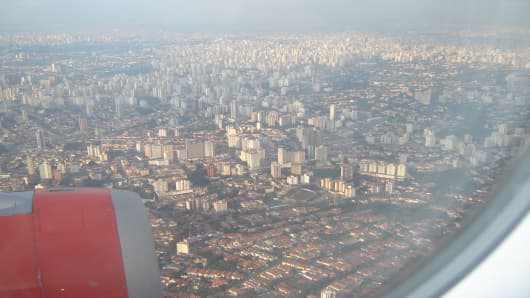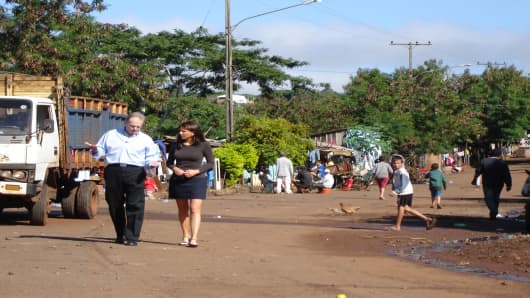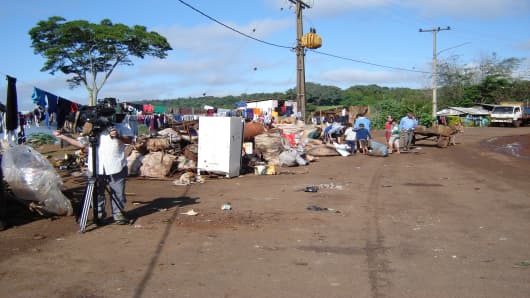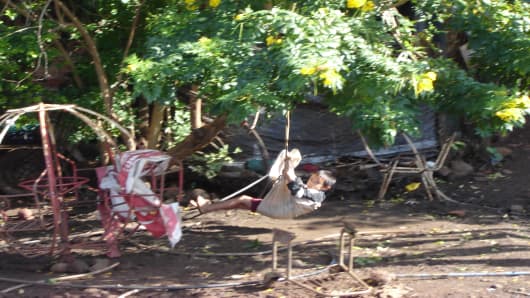It’s considered one of the most dangerous places in the Western Hemisphere — a small jungle town bordering three countries, Paraguay, Argentina and Brazil — and home to a myriad of unsavory characters: drug runners, arms smugglers and pirates.
Just getting here is a feat unto itself. (New York to Sao Paulo, Sao Paulo to Asuncion...then later Asuncion to Ciudad del Este.) I met my team in the Paraguayan capital of Asuncion. After traveling for a day and a half, I arrive at the Asuncion airport. It's an interesting, rather diverse cast of characters getting off the plane — a handful of missionaries from Canada, some Germans now living in Paraguay, a surprisingly large group of Taiwanese nationals now living in the region, as well as a dozen or so people from the Middle East. And of course, some Paraguayans.
I've traveled through dicey parts of the world before, including this part of South America, and not a whole lot makes me nervous. Still, I had read about the recent surge in "express kidnappings" and as a foreigner, traveling alone and carrying as much cash as legally possible
(our local team and guides prefer to be paid in American dollars) I'm avoiding a taxi in favor of a vetted driver. I collect my bags and clear customs but can't spot the driver anywhere. My cell phone doesn’t work (and you can forget about the Blackberry) so, I begin wandering around the airport pick-up area. After about 30 minutes (and the beginnings of some nervousness on my part) a young man walks toward me with a sign saying “Trish Regan,” introduces himself as Santiago and explains that David, the producer, is waiting at the hotel. Off we go.
Santiago gives me a quick drive-by tour of Asuncion. We speed past the Presidential Palace, a magnificent colonial style white mansion. We pass the Congress building, another large colonial structure with grand arches. Santiago points to the colonial architecture in the old part of town, explaining that Asuncion was the first city in South America settled by the Spanish empire. "Buenos Aires," he tells me referring to the Argentine capital, "was an after thought."
MONEY LAUNDERING JOINT?
Pretty soon we make it to the hotel — the newest one in town and a spot Paraguayans are proud of, albeit an American franchise. Interestingly, when my company's travel department called for reservations, the hotel was booked. Seemingly always booked. Our contacts on the ground had planned ahead however, and made reservations for us in-person for about half the rack rate. But, here's the catch: we are the only people staying in the hotel. The American investigator we're with later explains that's because the hotel is a big-time money laundering operation. So, now you know why it's always "booked".
I meet up with my team at the hotel: David Lewis, the producer who flew in from Atlanta several days ahead of me; Mario deCarvalho, a cameraman I had worked with previously and one of the best in the business. Mario, who came via South Carolina, has spent twenty plus years covering news and seen his share of hell-holes and war zones. He is an artist and great journalist who just happens to speak eight or nine languages (I've lost track, but one of them is Arabic which comes in handy on this story.)
Eduardo Lerina, a soundman from Rio de Janeiro, is also with us. Plus, we’ve got Mark McCabe, the American investigator out of Rochester, N.Y., who has been traveling to the Tri-Border to fight counterfeiters in Ciudad del Este for more than a decade. He’s here with his associates Stacey (a former U.S. government employee) and Elida. We're a bit of a motley crew. No sooner did we meet than we had, well, some surveillance, trailing us. Yes, surveillance.
We're Being Followed
Mark was the first to spot it. We were finishing our dinner at the hotel when he leaned towards David and me and whispered, "We're being followed." "Followed?" I asked.
"Don't look now," Mark warned, "But there's a guy behind us that hasn't left our side." Mark jesters to his left. "He's been following us all day. Probably not a big deal, he's only trying to figure what we're up to. You haven't logged onto your computer from your room yet have you?"
I shake my head 'no.'
"Well, make sure you don't,” he warns. “They'd just love to get in there and see what you're working on. Oh, and you're phones are being tapped. Assume all your conversations are recorded."
Uhm. Okay.
Mark explains that the hotel we are staying in is allegedly owned by the biggest cigarette pirate and smuggler in all of Paraguay. A man considered powerful and dangerous and who also recently ran for President. Only in Paraguay.
“He may have heard us talking about piracy and wants to make sure we're not doing a story on the cigarette industry or on him,” Mark offers.
When I go back to my room, I call my husband but am extra cautious on the phone. I avoid talking about our plans for tomorrow and any talk of terrorists or pirates. I also decide I don’t really need to log onto my e-mail or the Internet.
WORKING IN ASUNCION
Over the next couple of days we shoot, we shoot and we shoot some more. Interview after interview. Official after official. It's always interesting what people will tell you on and off camera. Off camera, officials admit to a connection with Hezbollah terrorists. On-camera, it's a different story. The same line keeps getting repeated.
"Well, Paraguay doesn't have any terror groups." That's because, in Paraguay, terror groups are not recognized. In fact, in Paraguay, you can donate all the money you want to al-Qaida. No questions asked. It's all legal. That said, intelligence officials say Hezbollah launched two terror attacks in Argentina in the early 1990s from Ciudad del Este, Paraguay.
The best part of our trip to Asuncion: I connect with a source who has documents linking members of the tri-border community to Hezbollah. The source provides us with bank records, letters, and intelligence documents--key elements and components to our story. Armed with documents and several interviews, we leave for the Tri-Border itself.
CIUDAD DEL ESTE, PARAGUAY: THE GLOBAL FRONTIER OF CAPITALISM
A grimy border town buried deep in the Paraguayan jungle, Ciudad del Este is home to the largest illicit economy in the Western Hemisphere. Here, anything and everything is for sale. This small city of roughly 225,000 people has become a haven for drug-smugglers, arms dealers, counterfeit good traffickers and terrorist financiers.
It is one of the last places you’d ever willingly travel to and yet, this is my second visit to the area in less than three years. (Hey, a good story is a good story.) I’m here to investigate the piracy and counterfeit operations in the region that are costing American companies billions of dollars in lost sales. I am also trying to understand how money is being funneled to terror groups in the Middle-East. According to U.S. intelligence, this region has become the second biggest source of funding for Hezbollah after Iran, generating hundreds of millions of dollars for the terror group every year.
It’s a Friday night in May when we arrive via plane in Ciudad del Este. (I’ve also traveled here by car but it’s a six-hour, highly dangerous trip thanks to bandits populating Paraguay’s roads. So this time, I decided to fly.) Our team now numbers about 12 including our production crew, the investigator we are profiling, his associates and our security. We have security because there are serious problems with kidnappings and robberies in the region. And as Americans (with lots of camera equipment), we’re targets.
It’s dark out when we arrive. We drive through the center of town--everything is closed. There are no restaurants, no clubs, really nothing here to attract a tourist. That’s because Ciudad del Este is pure raw commerce. When the shops open tomorrow morning at 5 am, this city will become a bee-hive of activity…at night, there are come trucks being unloaded but most of the activity is concentrated on the banks of the Parana river where smugglers move goods in tiny boats from Paraguay into Brazil and Argentina.
We are staying at a safe-house recommended by investigator Mark McCabe. It’s a secure neighborhood - so secure we must pass through several layers of guards to get to our accommodations. Ironically, it also happens to be the area of town where the chief smugglers and pirates live. “Still,” Mark advises, “We’re safest here. They don’t want problems in their own neighborhood.”
The next morning we head out first thing to the center of town. It’s so jammed with people you can barely move. People carrying boxes filled with goods, trucks unloading everywhere, merchandise getting packed up for shipment - and everywhere I look? Counterfeit goods for sale. From Chanel sunglasses and Gucci handbags to DVDS of newly released movies, Sony cameras, Apple Ipods and Nintendo video games. You name it, the knock-off version is here.
Brokering a Counterfeit Deal
We come across one store with Microsoft Windows Vista for sale…and both my Spanish and bargaining skills come into play. I broker a deal with the salesman for 1000 copies of the program. Five dollars a piece (a fraction of the $100 plus US sticker price) and he’ll ship them to Brazil for me. “I’ll think about it,” I say.
From Software to Guns
Next up: a weapons store. I sit this one out because the men in my group think I’m a dead giveaway. (And yes, they’re probably right. Posing as an arms dealer has never been my strength.) So Mario, our cameraman, goes instead. His hidden camera equipment captures AK47s, rifles, handguns, bullets and people buying weapons -- no questions asked. He captures video of weapons being wrapped in brown paper so they can be anonymously smuggled across the border.
Trans-shipment Point
Ciudad del Este is also known as the Tri-border because it is located at the point where Paraguay, Argentina and Brazil meet. Pure geography combined with the lawlessness of the region make the tri-border an ideal shipment point for illegal goods. Everyday, 25,000 people cross the “Puente de Amistad” (Friendship Bridge) from Paraguay into Brazil…many are smuggling goods across the border. There’s little scrutiny. You mu
st make an effort to get your passport stamped.
THE RAIDS
We're invited on a series of raids with McCabe’s team. McCabe To do this, McCabe’s investigators and informants spend weeks gathering information on who is selling the counterfeits. They then work with local prosecutors to secure search warrants…and then, they’re off.
We meet them at a restaurant on the outskirts of town. Stacey, Elida, and several other investigators lay out the maps, showing which stores they plan to target. The Paraguayan financial police team, known as UTE, goes over a plan with them, but pretty soon, the calls start coming.
“We need to move fast. We need to move now," Stacey warns. "We’re getting calls that they’re starting to move the merchandise. The pirates have been tipped off. They know we’re coming.”
We rush to the cars. Mario deCarvalho and I are thrown into the back of a van with several members of the financial police. The phones keep ringing. “They’re moving merchandise. We’ve got to get there now!” one of the investigators shouts.
We speed through town, the rain slamming against the windshield. We stop near the first location at the Gebai Center, a mall in the center of town. The police rush out of the vehicle and I follow them, running through densely packed, muddy streets until we arrive, ironically, at the very same place where I had brokered the Microsoft Vista deal that morning. All the software that was displayed on the shelves just hours earlier is now gone. Somehow, someone knew there was a raid coming.
We move onto the next location — another store inside the Gebai center. Sure enough, McCabe and his team find Motorola counterfeit batteries by the thousands. What I find most amazing about these products is that they look exactly like the real thing. Right down to the labels and holograms. The only way to tell that they’re not real is with a special illuminating device made by Motorola that’s flashed on the hologram. The raids go on all day and tens of thousands of dollars worth of merchandise is collected.







